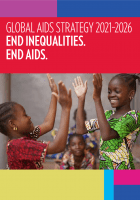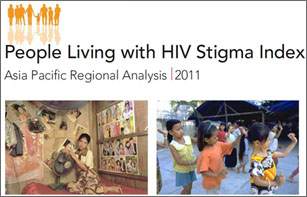“HIV-related stigma is pervasive in the lives of people living with HIV. Stigma marks people as different and as disgraced... Stigma manifests in discriminatory and sometimes violent treatment of people living with HIV, their families and others affected by HIV.”
These are the opening words of the report entitled the People Living with HIV Stigma Index: Asia Pacific Regional Analysis launched on the fourth day of the 10th International Congress on AIDS in Asia and the Pacific (ICAAP), held in Busan, Republic of Korea.
Although data in the analysis often differs widely depending on country context, the analysis shows that stigma and discrimination remain rife across the region as a whole and are evidenced in many environments, including family and community life, as well as employment and health care.
For example, the study found that high percentages of people living with HIV had lost jobs or income in the last 12 months based on their HIV status: from 16% of those surveyed in Fiji to 50% in Cambodia. Elsewhere, people have experienced being refused the opportunity to work – from 9% in Bangladesh to 38% of those surveyed in the Philippines.
Stigma and discrimination based on HIV status, sexual orientation or lifestyle choice is unacceptable and hampers the AIDS response
Mr Michel Sidibe, UNAIDS Executive Director
“Stigma and discrimination based on HIV status, sexual orientation or lifestyle choice is unacceptable and hampers the AIDS response,” said Michel Sidibé, when sharing some of the findings at an earlier session of ICAAP. “The Stigma Index is an important initiative to increase the evidence base that will enable governments and civil society partners to work more effectively to reduce HIV-related stigma and discrimination,”
Nine-country analysis
The report is a synthesis of nine country studies conducted across the Asia and the Pacific region — Bangladesh, Cambodia, China, Fiji, Myanmar, Pakistan, Philippines, Sri Lanka, and Thailand — and provides the first large-scale regional comparison of standardized HIV-related stigma indicators.
Across the nine countries, discrimination in health care settings is documented as a recurring issue. Across countries in the analysis, data shows that many people living with HIV avoided clinics and hospitals for fear of being discriminated against because of their HIV-positive status. In health-care settings, confidentiality and involuntary testing for HIV were also cited as issues of concern.
The report shows discrimination is a reality for all ages. Up to 35% of people living with HIV in China under the age of 25, for example, reported that teachers were discriminatory to them based on their HIV status.
A pervading issue across the nine-country analysis was the incidence of verbal insults and threat felt by people living with HIV: in Myanmar up to 45% of those surveyed said they had experienced such discrimination.
Even when study respondents had not experienced direct discrimination, they had a generalized fear of discrimination and modified their behaviour accordingly, the report suggests.
The analysis examines how ‘self’ stigma is also an issue for people living with HIV. According to the country reports analysed, over a third of people living with HIV in Thailand decided not to marry. In Bangladesh this figure is even higher — to up to 77% — with 85% of people living with HIV in the country also deciding not to have any more children because of their sero status.
At the launch of the analysis, Positive Women’s Network youth coordinator Sangeeth Dolapihilla underlined how such stigma is common for people living with HIV. “The Stigma Index showed that people living with HIV have a lot of internal stigma — we feel we can’t have sex, we can’t have kids,” she said. “What is it going to take for our needs to be addressed, and get rid of this internalized stigma?”
Evidence for action
With the aim of documenting HIV-related stigma and discrimination and providing a mechanism to compare experiences in different settings and across time, the analysis findings will be used to inform national HIV responses. The studies can also act as a baseline against which progress on decreasing stigma and discrimination can be measured.
The report includes recommendations for countries, such as ensuring that stigma remedies are embedded in cohesive national HIV policy and programmatic responses, improving legal and policy responses to HIV-related stigma and discrimination and strengthening policy and practice to reduce HIV-related stigma and discrimination in health-care settings.
The Stigma Index initiative is a collaboration between the Global Network of People Living with HIV, the International Community of Women Living with HIV/AIDS, the International Planned Parenthood Federation, and UNAIDS.
The initiative is important not only in findings but also in process: the Stigma Index employs a wholly participatory approach where the research strategy and data collection is led by organizations of people living with HIV with support of domestic and international partners.









